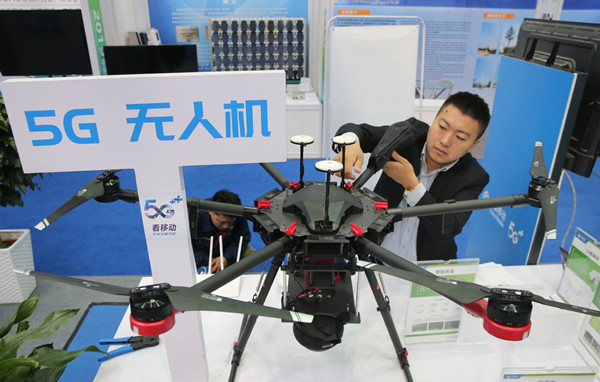5G Applications Enhance Several Industries

A China Mobile employee displays a 5G-enabled drone during an exhibition in Nantong, Jiangsu province. [Photo by Xu Congjun/For China Daily]
At the mountain-ringed Tingzikou hydropower station in Guangyuan, Sichuan province, a gigantic 5G-enabled underwater robot swims in a stilling basin, which is basically a 20-meter-deep pool or reservoir that can reduce turbulence of water flow.
Equipped with cameras, the robot will shoot pictures and videos of the pool walls and transmit them in real time to a command center, which then determines whether the walls are strong enough to withstand future floods, or if they would need repairs.
The robot is part of a 5G-powered hydropower station project jointly executed by China Mobile, China Datang Corp, one of the largest power generation enterprises, and Tsinghua University. It is the first time that the superfast 5G technology has been applied in the hydropower sector in China.
The endeavor is also part of China Mobile's broader push to promote 5G applications in traditional sectors.
China Mobile is working hard to partner with electricity, tourism, manufacturing and healthcare industries to explore where the biggest potential is for 5G to boost efficiency in real business cases and promote industrial upgrade.
Wang Haoran, an expert from Tsinghua University's Sichuan Energy Internet Research Institute, said every three to five years, or every time after a major flood, the Tingzikou hydropower station's stilling basin undergoes a thorough check.
In the pre-robotics era, workers would undertake deep dives to build a cofferdam for such checks, which were relatively inefficient, time-consuming and tended to hamper electricity supply. "Such a process could consume three to six months and cost around 5 million yuan ($748,000)," Wang said.
But 5G robots can accomplish the task in about 20 days as they obviate the need to pump out water from the stilling basin, besides doing some basic work like removing silt. "The cost of each check can be lowered to 700,000 yuan," said Wang.
5G-powered drones are also used in dam checks. By integrating artificial intelligence, big data and other cutting-edge technologies, China Mobile has built a high-precision dam surface inspection system that uses autonomous 5G drones, which can map in 3D.
Currently, workers remote-control 5G robots and drones. But China Mobile said it is working hard with China Datang Group toward unmanned smart checks of hydropower stations.
The 5G-enabled hydropower station is one of China Mobile's 100 key 5G industrial projects across 15 industries. Earlier this year, Zhao Dachun, deputy general manager of China Mobile, said, "Industrial customers demand not only large bandwidth, low latency and large-scale connectivity of 5G, but also call for efficient operations and maintenance and other diversified network capabilities."
As of September, China Mobile has built more than 350,000 5G base stations. Its 5G services are available in all Chinese cities at prefecture level and above. This has laid a solid foundation for wider industrial applications of 5G.



